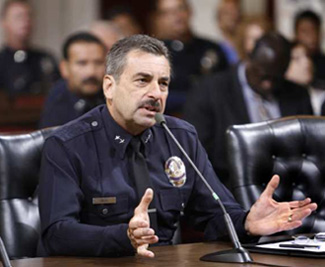
Los Angeles Police Chief Charlie Beck. (LA Times)
Los Angeles Police Chief Charlie Beck issued a statement Friday saying he disagrees with a decision by a judge to block enforcement of a major provision of Jessica's Law, which restricts how closely sex offenders can live to schools or parks.
Los Angeles County Superior Court Judge Peter Espinoza concluded that the controversial measure left sex offenders in some areas with the choice of being homeless or going to jail because the law prohibits them from living in large swaths of some cities such as Los Angeles.
The temporary ban led state corrections officials to order parole agents not to enforce Jessica's Law residency requirements in Los Angeles County. More restrictive measures remain in place to regulate "high-risk" sex offenders whose crimes involve violence or repeated sexual offenses.
In his 10-page ruling, issued Monday after four registered sex offenders petitioned the court, Espinoza referenced Beck and LAPD data that there had been "a marked increase of homeless/transient [sex offender] registrants." In 2007, there were 30 sex offenders on active parole in Los Angeles. By this September, that number had jumped to 259.
"Rather than protecting public safety, it appears that the sharp rise in homelessness rates in sex offenders on active parole in Los Angeles County actually undermines public safety," wrote Espinoza, who is the supervising judge of Los Angeles County criminal courts. "The evidence presented suggests that despite lay belief, a sex offender parolee's residential proximity to a school or park where children regularly gather does not bear on the parolee's likelihood to commit a sexual offense against a child."
The LAPD statement said those referenced statistics were prepared in a report to the Los Angeles City Council's public safety committee "with information related to the concentration of sexual registrants in residential housing, not the merits of Jessica's Law."
"This report, approved by Chief Beck, was intended solely to discuss the potential impact of additional restrictions placed on top of Jessica's Law and not to draw a conclusion on the merits of any provision in Jessica's Law," the statement reads.
The temporary ban on the residency restrictions in the county, which has sparked an emotional debate, is not the last word on the issue. Espinoza could revisit his decision in the case brought by four sex offenders on parole, or the case could be challenged. Corrections officials said Thursday they would appeal the ruling.
Proposition 83, overwhelmingly approved by state voters in 2006 and informally known as Jessica's Law, imposes strict residency requirements on sex offenders, including rules forbidding them from living near locations where children gather. Before the law passed, those residency requirements were imposed only on offenders whose victims were children.
There are about 5,100 registered sex offenders in Los Angeles, and about 1,020 of them are prohibited under Jessica's Law from living near places where children congregate. Throughout Los Angeles County, about 2,000 registered sex offenders are subject to residency restrictions.
Civil rights attorneys have argued that provisions of Jessica's Law make it impossible for some registered sex offenders to live in densely populated cities. Nearly all of San Francisco, for example, is off-limits to sex offenders because of the number of parks and schools close to housing. Los Angeles officials also said there are few places in the city where sex offenders can find housing that meets Jessica's Law requirements.
State Sen. George Runner (R- Lancaster), the author of Jessica's Law, said Thursday that most parts of the state still have ample housing for sex offenders, including Los Angeles County. Runner said he was confident the geographic rules would eventually be restored in L.A. County and elsewhere.
Runner said he believed Espinoza's order might prompt local cities to place greater restrictions on the neighborhoods where sex offenders can live than what Jessica's law allows, which is being explored in the city of Los Angeles.
Espinoza noted he acted amid a flurry of challenges to Jessica's Law residency restrictions. He wrote that the court has received about 650 habeas corpus petitions raising similar legal issues, and that hundreds more were being prepared by the public defender's and alternate public defender's offices in Los Angeles County.











